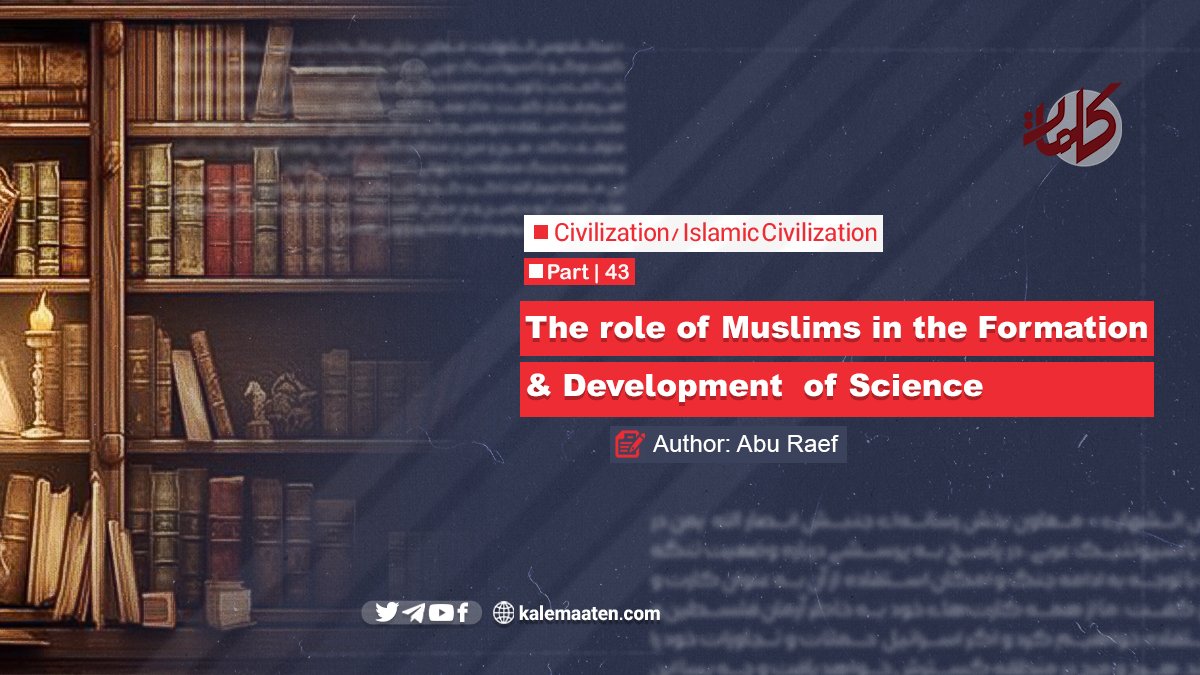Author: Abu Raef
The Role of Muslims in the Formation and Development of Sciences (Part 43)
The Role of Muslims in the Science of History
Undoubtedly, the science of history began with the emergence of human society—when humans first started recording aspects of their lives, thereby opening a new domain of self-knowledge. It is clear that this form of knowledge emerged in response to the social needs imposed upon human communities from the beginning; therefore, history possesses a social function as it fulfills the need for self-awareness within human society.
Imam Ibn Khaldun stated:
“The science of history is among the sciences that nations and generations engage with, for which they travel, and to which both merchants and laymen are drawn. In it, kings and nobles compete, and both scholars and the unlearned comprehend it alike. Outwardly, it may appear to be no more than stories of past ages, states, and generations—where speech flourishes, proverbs are quoted, and gatherings are adorned with it. It presents the states of people and how their affairs transform—the expansion of empires, the development of lands, and eventually, their decline and extinction.
But inwardly, for those who delve deeply into history, it provides analytical and investigative insights into phenomena and their origins—a precise science about how events occurred and their underlying causes. Therefore, it is a discipline firmly rooted in wisdom and deserving of being regarded as one of the legitimate sciences.”
The science of history is defined as:
The knowledge of the conditions of peoples and their lands, their customs and traditions, the industries of individuals, their genealogies and deaths, and similar matters. Its subject matter includes the circumstances of past individuals such as prophets, saints, scholars, sages, kings, poets, and others. Its aim is to gain awareness of the past, to learn lessons from it, and to draw warnings from historical events; also to derive experience from the changes of time so as to avoid losses and benefit from advantages. This science is, in fact, a second life for those who contemplate it—like the profit travelers gain from journeys.
Islamic historical science also formed with its own distinct originality and independence. It arose from within Islamic society and in response to the needs and objectives of that society. Islamic history was not an imitation of others nor a mere borrowing from previous historical thoughts and writings; rather, it emerged from the religious consciousness of Muslim historians and was a complement to the religious sciences. The foundation of Islamic historiography was the Hijri calendar, according to which events and dates were recorded.
In the pre-Islamic period and the early days of Islam, Arabs preserved history in their memories and did not record it in writing. This was not due to ignorance of writing, but because they preferred memorization over documentation; writing did not carry any particular prestige in that society—unlike memorization, which did. Hence, early Arab history (including events, days, and wars) was preserved in memory and transmitted orally.
However, when Arab Muslims moved beyond their native regions and engaged in conquests in foreign lands—encountering peoples who did not speak their language—their reliance on memory declined and the need for documentation emerged. Especially by the late second century AH, Muslims strongly felt the need to record and transmit the Hadiths of the Prophet (peace be upon him), his biography, and related historical accounts. This marked the beginning of written Islamic history. The widespread documentation of Islamic history took place when the people of the conquered lands converted to Islam and learned Arabic—because their previous civilizations had already given them an appreciation and sensitivity toward historical inquiry. For this reason, many of the earliest Islamic historians were non-Arabs who had learned Arabic.
In its early stages, Islamic historical studies focused primarily on the biography of the Prophet Muhammad (peace be upon him), accounts of his battles, and the migration of Muslims to Abyssinia and later to Medina. Makkah and Madinah were the two main centers of this historical movement.
Historians, like Hadith scholars, initially relied on oral transmission—indicating that early Islamic historiography followed the method of Hadith science: historical reports included chains of narrators (isnad or sanad) followed by the content of the narration (matn). Thus, the earliest historical texts, such as the books of Maghazi and Sira, were combinations of Hadith and history. The primary motivation for this focus was the importance of the Prophet’s sayings and actions for Muslims, which they needed as guidance and examples.
Thus, two main approaches to historical writing developed among Muslims:
– The first was the method of the Hadith scholars, which is clearly evident in the Prophet’s biography, characterized by the use of narrations with specific chains of transmission.
– The second was the approach of the Akhbariyyun (traditionalists), which aimed to present a complete picture of historical events, with detailed narratives, poems, and speeches—this method originated in Kufa.
Later, a combination of both methods emerged, and other schools of historiography developed, focusing particularly on topics such as battles, Islamic conquests, and genealogy.
Among the most famous Akhbariyyun were:
– Aban ibn Uthman ibn Affan
– Imam Muhammad ibn Shihab al-Zuhri
– Imam Ibn Ishaq
– Imam Awana ibn al-Hakam al-Kalbi
– Imam Saif ibn Umar al-Kufi
Additionally, Imam al-Mada’ini was one of the most prominent Akhbariyyun, as he relied more heavily on documentation and followed the method of Hadith scholars in critically assessing, analyzing, and organizing narrations.
Continues…
Previous Part/ Next Part
[1]. What Did Muslims Offer to the World? p. 354, quoted from Al-‘Ibar wa Dīwān al-Mubtadaʾ wa al-Khabar by Imam Ibn Khaldun, Vol. 1, pp. 3–4.
[2]. Ibid., quoted from Abjad al-ʿUlūm by Imam al-Qannawji, Vol. 2, pp. 137–138.
[3]. Rosenthal, Franz, The Science of History among Muslims, translated by Ṣāliḥ Aḥmad al-ʿAynī, Al-Risāla Institute, Beirut.
[4]. Majid, ʿAbd al-Munʿim, The History of Islamic Civilization in the Middle Ages, pp. 111–112, 1999, Cairo, Egypt.
[5]. What Did Muslims Offer to the World?, p. 356.
[6]. Ibid.



